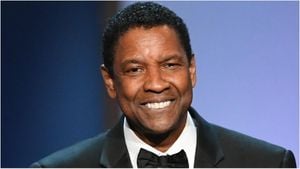Ridley Scott’s highly anticipated sequel, Gladiator II, has finally hit theaters, leaving fans buzzing with excitement—and quite a bit of debate. Released 24 years after the original Gladiator, which snatched the Best Picture Academy Award, this sequel brings viewers back to the tumultuous world of the Roman Empire, this time through the eyes of Lucius, the son of the original flick’s hero Maximus. But can it live up to the legacy of its predecessor?
The response from audiences and critics has been mixed, with many praising the action sequences and visual effects, but equally questioning the depth of character development and the overarching narrative. Upon its opening, Gladiator II quickly became the subject of comparisons to Scott's 2000 classic, with fans eagerly assessing whether it captures the same gripping drama and emotional weight.
Initially, the film seems to echo the original's structure. Lucius is portrayed starting as the peasant Hanno, who faces a grim fate when Romans overthrow his peaceful life. Fast forward sixteen years since Maximus's legendary stand against tyranny, and you have the empire floundering under the chaotic rule of two young emperors, Geta and Caracalla. Their reckless decisions plunge Rome back to military campaigns and strife, necessitating the return of gladiatorial bloodshed.
One of the most commendable aspects of Gladiator II is undoubtedly its action sequences. Critics agree they are, for the most part, grander and more dazzling than the original. The film begins with the siege of Nubia, setting high expectations from the very first scene, showcasing far more elaborate tactics and unprecedented battles featuring gladiators squaring off against wild animals like rhinos and baboons. The use of CGI allows for some impressively exaggerated action scenes, including naval battles fought within the Colosseum.
Yet, some critics feel the broader spectacles come at the cost of intimacy and character focus. Many agree Lucius’ story, though intriguing on some levels, feels less personal compared to Maximus’ vendetta against Commodus. There’s no denying the emotional richness of Maximus's quest, beautifully depicting themes of revenge, love, and loss. Still, the connection between Lucius and his adversary, General Acacius, is described as lacking the impactful stakes of the previous rivalry. Critics have noted there’s more of a sense of distance rather than the visceral tensions seen before.
Gladiator II also features noteworthy casting, with Paul Mescal leading as Lucius, flanked by heavyweights such as Denzel Washington and Pedro Pascal. While Washington’s performance as the antagonist has captured the spotlight, many critics suggest Mescal struggles to deliver the gravitas exhibited by Russell Crowe's Maximus. The weight of legacy can be challenging to shoulder, and some found the transition from Maximus to Lucius lacking the thunderous appeal one would expect. On the other hand, Washington’s theatrical portrayal of Macrinus, the puppet master character, garners significantly more acclaim, imbued with flair and charisma.
A hallmark of the original Gladiator was its exploration of significant political themes, intertwining personal motivations with broader societal questions. The struggle between the ideals of governance, as exemplified by Marcus Aurelius, and the chaos brought on by flawed leadership provided rich narrative layers. Critics have remarked, though, how Gladiator II does not quite capture this thematic depth. Rather than presenting insightful analyses of power dynamics, its political themes often devolve to characters reciting lines from the original, leading some to feel as though the sequel offers little more than hollow nostalgia.
Visually, Scott's direction has been met with divided opinions. Some have praised the film for its ambitious scale and impressive action design, celebrating it as Scott's audacious return to form. Yet, others have remarked on its perceived flatness when compared to the sumptuous visuals of the original film. Subtlety takes a backseat here; dynamic direction feels lost amid poorly rendered CGI during key moments. There are instances where the blood and gore feel almost sanitized, stripped of the visceral artistry Scott previously employed.
Critics have noted how the film’s pacing oscillates. The first act races through Lucius's transformation—yet the second act evolves dramatically as Lucius finds his moral compass amid rising chaos. This shift intrigues many, emphasizing character evolution and moral conflict, but also raises questions about narrative coherence.
Nevertheless, many agree Gladiator II delivers on entertainment, with dazzling battles and notable performances. It may not reach the emotional and thematic heights of its predecessor but shines with its grandiosity. It’s described as being almost as entertaining, though not as groundbreaking, as the first film. Critics differ on whether it can be labeled as 'better,' but it definitely carries enough charm to warrant viewership.
The film concludes with twists and turns, immersing Lucius back at the center of the conflict where he inspires hope for Rome’s future. Critics appreciate how it aims for closure, ending on poignant yet ambiguous notes, leaving many pondering the potential for more stories from this world.
Fans are left wondering: does Gladiator II set the stage for another sequel? Director Ridley Scott himself suggests ideas for Gladiator III, indicating this saga may not be finished yet. With audiences clamoring for more tales from the Colosseum, it seems likely we’ll continue to witness Scott's daring exploration of ancient Rome.
Overall, Gladiator II has undeniably sparked conversation, captivating some audiences with nostalgia and excitement, drawing critique and analysis from others. It might not achieve the legendary status of Gladiator, but it undeniably entertains, and perhaps that's enough for now. How the audiences will receive it after the dust settles remains to be seen, but for the time being, this epic sequel has filled the arena with noise, excitement, and plenty of action.



